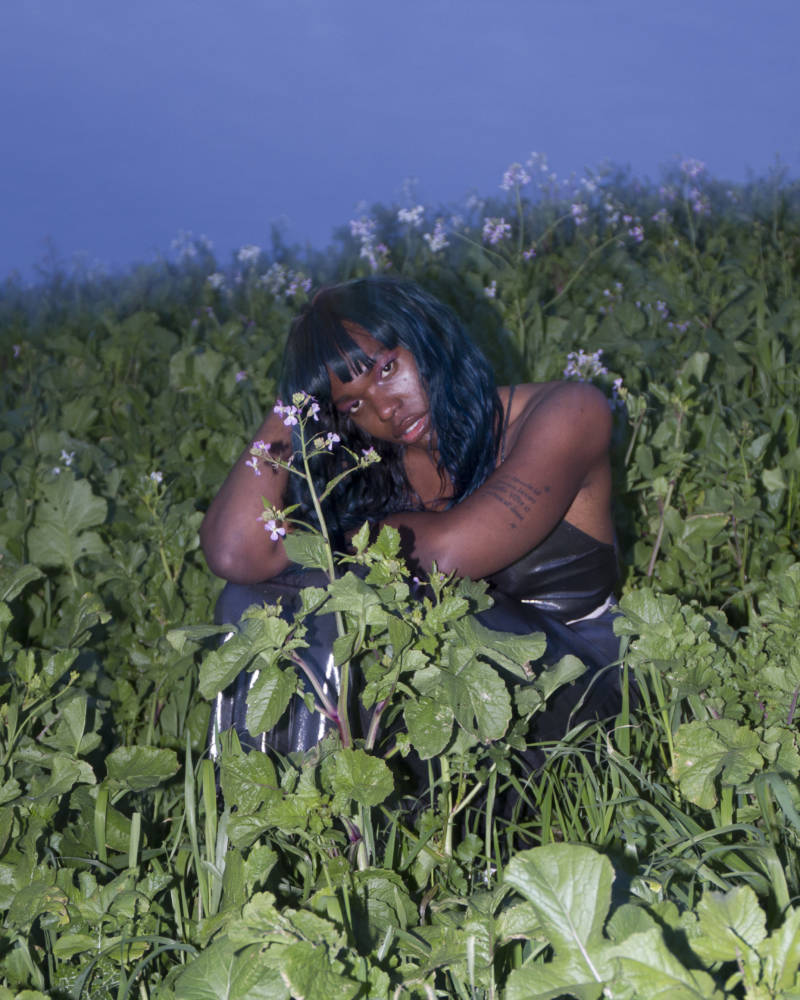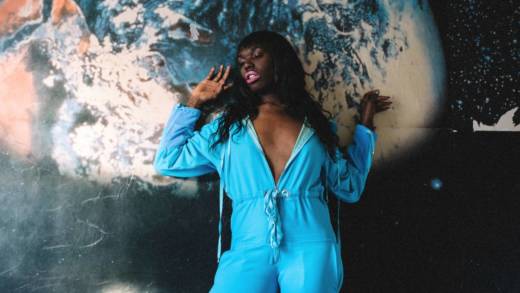“It’s very rare that I do a performance that’s not for a queer event. I do think it would be interesting if I had more crossover,” she says, adding with a shrug that straight promoters rarely book her. “I think about like, ‘Who are the black trans women making indie electronic music in America?’ I know there’s more than just me, and we’re out there, but how do we bubble up and get recognition?”
Amerasu has always been a bit of a nomad. Her mom, whom she describes as an “Afrofuturist hippie,” moved their family often: as a child the musician lived in Florida, Oregon, Texas, Michigan, and Washington. As a young adult she enrolled in Cornish College of the Arts in Seattle to study musical theater, but dropped out after a semester and moved to Austin, Texas.
There, she began the process of transitioning. It didn’t take long to find out she was not in a supportive environment for trans people.
“My roommate was like, ‘I think what you’re doing is wrong. You have two weeks to leave the house,’” she says. “I had a little bit over $1,000 saved so I just moved [to the Bay Area].”
Amerasu is candid, in her music and in person, about the ways life’s challenges have shaped her. She tackles a variety of heavy themes in Rebecca’s five tracks: Being a victim of sexual assault, turning to drugs to cope with a loved one’s death, and dealing with men who are secretive about their attraction to trans women. Her lyrics can be brutal in their honesty, but Amerasu also spins them into sparkly, lo-fi pop gems with her loop pedal and keyboard, juxtaposing her soulful voice with ebullient electronics. “Klonopin,” the EP’s lead single, does this masterfully: I want to forget my life / I want to forget my strife, Amerasu sings in a falsetto, over trap high-hats and twinkly keys that evoke a toy piano.
She wrote “Klonopin,” she says, during a particularly rough period last year, when her friend, the trans writer Bryn Kelly, died of an apparent suicide.
“The only way that I could get through my day was I was taking [MDMA] at night and then feeling sad the next day and taking Klonopin and drinking — not really having good coping skills dealing with loss,” she says, her voice shaking slightly. “But it was really needed for me at the time. I was having a lot of anxiety around death.”
Rebecca takes its name from Beyonce’s infamous “Becky with the good hair” line from “Sorry,” a track from Lemonade. Since that album’s 2016 release, the name Becky has become synonymous with a Starbucks-sipping white woman oblivious to her own privilege.
“The backlash of a lot of white tears and the idea of ‘Becky’ being a racial slur — and the idea of white fragility at the detriment of black power — is something that comes to my mind when I think about it,” she says. “The idea behind it is ‘Becky’ is someone who thinks their life is so hard or white people are being oppressed. Which is not true.”
Amerasu tackles this theme with humor on the track “Meg Ryan,” an ’80s-inspired synth-pop jam that calls to mind Cyndi Lauper or early Madonna. “I’m a white woman, I can do whatever I want,” Amerasu talk-sings in a valley girl voice. In the track’s music video, she traipses around town in a blond wig, widening her eyes in an expression of faux doe-eyed innocence.
Amerasu remains an optimist, however, even as she takes on heavy life experiences in her music. When I ask her what she likes to do for fun, she smiles mischievously. “Party,” she says, simply.
“In the face of oppression, how else are we supposed to … ?” she trails off.
“There are other ways you can clear your mind and stuff, but I think it’s okay to drink or do drugs or whatever you f-cking need to push you through the day,” she says finally. “I think it’s a fallacy to think that there’s only one way to be.”
And then her face changes, as it does, from a serious and thoughtful expression to a sly grin. “I’m doing me.”

Star Amerasu performs at 9pm on Wednesday, March 1 at El Rio in San Francisco. $5-$10 sliding scale; details here.




